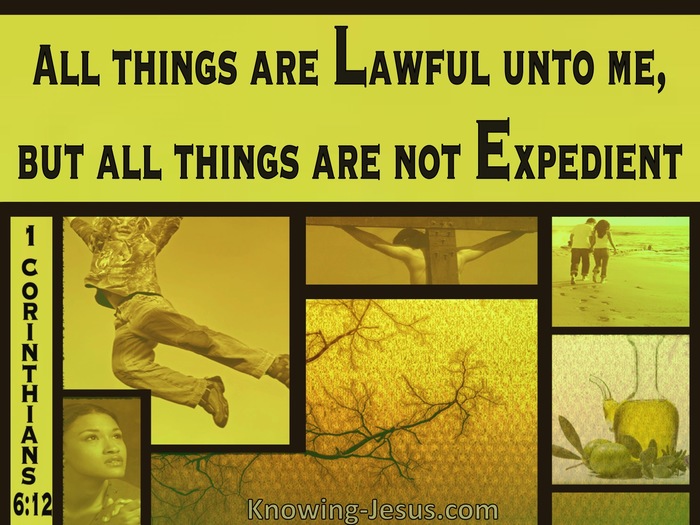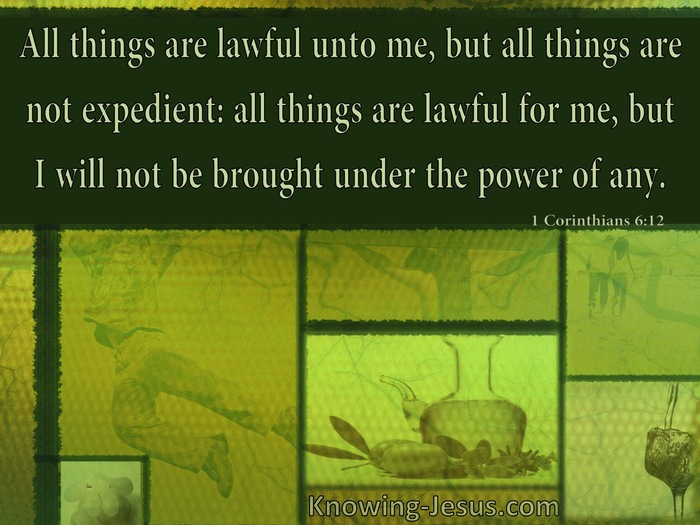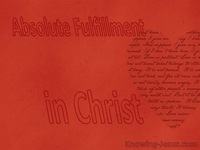◄ What Does 1 Corinthians 6:12 Mean? ►
All things are lawful for me, but not all things are profitable. All things are lawful for me, but I will not be mastered by anything.
1 Corinthians 6:12(NASB)
Verse of the Day
There was significant division among the Christians at Corinth. Oh, they were saved by grace through faith in Christ, for they were identified by Paul as 'saints.' They had also been equipped with many spiritual gifts and were described as being positionally 'sanctified in Christ' and 'set apart' unto God.
However, they were stuck in spiritual infancy and Paul described them as 'carnal believers'. They were not growing in grace or maturing in the faith and Paul had to deal with a multitude of problems which they needed to address, both individually and collectively.
There was petty division among believers and some were even engaged in gross, sexual immorality. Some were participating in lawsuits among themselves and others displayed much moral laxity and licentiousness. Their witness to a lost world of unsaved men and women was ineffective and counter-productive, and discredited the Lord Who bought them.
Having spent some considerable time exposing their unacceptable behaviour, Paul continued by laying down some principles and practices for believers and in this verse, he deals with judging between right and wrong and recognising that in this Christian dispensation, all things are lawful for post-Cross Christians although not all things are expedient.
As Church-age believers, we are not under law but under grace, which means that we are called to live by a supernatural standard which is only achieved when we live for Christ, die to self, walk in spirit and truth, and submit to the leading and guidance of the Holy Spirit.
As Church-age believers, we are not subject to the Mosaic Law (and its many regulations) given to Israel as part of their covenant relationship with God. The prime objective of the Mosaic Law was to identify sin and point the sinner to Christ. Nor are we bound by any man-made laws, religious rules, or legalistic regulations, which are too often imposed by denominational churches or legalistic individuals.
As Christians, we are not required to do certain things that were required of Israel e.g. keep certain feasts, visit certain places, eat certain foods, or act in certain ways, as part of our 'religion' or faith. However, we should always recognise that although all things are lawful for us, not all things are expedient.
As believers, we are not required to stick to certain forms, formulas, rites, or rituals which supposedly identify us as Christians, nor are we required to keep ourselves 'saved' by adhering to such things. We are not ordered to attend certain feasts nor required to participate in particular ceremonies. We are not excluded from engaging in certain activities (like feast days) but we are not required to carry out designated regulations or compulsory acts to maintain our position in Christ. We are free from any form of legalism.
Paul recognised that in our liberty, we may discover that our freedom causes us to be emotionally or spiritually bound - and so he concludes - all things are lawful for me, but I will not be brought under the power of any such thing. The freedom we have in Christ sets us free from the restrictions of legalistic rituals and religious regulations BUT we must be careful that we do not become entrapped in any activity which places us in bondage - or allow it to become an obsession in our life. We must be very careful that the freedom we enjoy does not become legalistic - or used to criticise others who engage in legitimate activities from which we choose to abstain.
In this verse, Paul is setting out TWO distinct principles that all Christians should recognise and adhere to:
1) Certain things may be permissible but they may not be profitable for our spiritual growth or the spiritual well-being of others. Our freedom in Christ may be perfectly legitimate, but could deflect our attention away from Christ or cause another believer to stumble - in which case we should avoid it so as to keep ourselves from backsliding or prevent a Christian brother from stumbling in their spiritual growth e.g. eating certain foods or attending certain functions.
2) Something may be completely legal and lawful, but should be avoided if it causes us personally to become addicted to it, or we allow it to affect our relationship with the Lord Jesus or another Christian brother or sister e.g. certain social activities or even the use of the internet! Once again, it is important to identify it and deal with it.
This verse is not dealing with sinning which is clearly laid out in Scripture for our learning - but is explaining that if legitimate actions or activities cause us, or another Christian, to backslide or stumble, we should recognise the problem and quickly turn from it, for although "all things are lawful unto me, not everything is expedient - and although all things may be lawful - I must never be brought under the power of anything."
My Prayer
Heavenly Father, thank You for the freedom I have in Christ. Thank You that I am not under any form of the Law, but under grace. Keep me from sin, I pray, and give me wisdom to recognise things that are permissible, but which are not expedient, and help me to live my life in a way that honours You. Thank You that in Christ, all things are lawful unto me, but I pray that I will not cause another to stumble or backslide in my own Christian life. In Jesus' name, AMEN.
Choose a Verse from 1 Corinthians 6
1 Corinthians 6:12 Further Study
- 1 Corinthians 6:12 in the Parallel Bible
- 1 Corinthians 6:12 in the Thematic Bible
- 1 Corinthians 6:12 Cross References
- 1 Corinthians 6:12 Treasury of Scripture Knowing
- 1 Corinthians 6:12 Sermons
- 1 Corinthians 6:12 Prayers
- 1 Corinthians 6:12 Images
- Choose Chapter
Never miss a post















